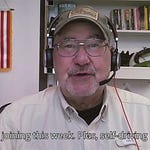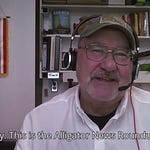I was up to my waist in muddy water, alone, 9,000 feet up on a remote mountain, with my only source of transportation hopelessly mired in slick mud on a waning autumn afternoon.
The mudhole was not deep, not more than 2-1/2 feet, but my boots found no traction at the slimy bottom. The Arctic Cat ATV was canted at an angle, the brown water barely below the saddle.
Four-wheel-drive was an invaluable feature of the quad, but four fat tires held enough air for buoyancy. The bike was trying to float, killing any possibility of traction.
I struggled beside the bike, half-in, half-out of the water, attempting with little success to get a grip on the frame and inch the beast forward.
A delightful solo vacation
It had seemed like such a good idea, this side trail from the main route between Pitkin and Tincup. The customary path is over Cumberland Pass, a smooth graveled road, well-traveled and suitable for passenger car traffic. Cumberland Pass is at 12,000 feet. There are no guard rails, but the grade is gentle, the curves wide and generous, and the mountain views of this portion of Colorado stunning.
But I had traversed Cumberland many times and sought something slightly more adventurous. A rugged jeep trail, well marked by county signage, promised a trip over the lower-altitude Napoleon Pass. It would take a little longer, but it came out at Tincup Cemetery a quarter-mile from the main road.
Napoleon Pass: No passenger cars, no traffic… and no one to help in time of distress.
Near the summit, I rounded a corner among thinning trees and was met with a 20-foot-long stretch of muddy water. Heavy brush lined both sides. I paused, considered the options, then shrugged. Why not? It’s an adventure.
I engaged the 4-wheel drive and accelerated into the water down a gentle slope. Which fell away immediately as water rose above my knees. I felt the front tires begin to lift as they lost traction.
When the going gets tough, step on the gas
Nothing for it but to press one. I tweaked the throttle to maximum and felt the rear tires bite momentarily. I knew there was a small rooster-tail of dirty water churning out behind the machine as the one-cylinder engine roared its best.
Its best was not good enough, succeeding only in propelling us into the deepest portion of the mudhole, where all four tires spun helplessly. I rocked the machine by shifting my weight frantically.
No joy. There we sat. I shut off the engine and surveyed the ugly brown water swirl gently to a stop around me. I slid off the seat and waded out, then stood in the stillness of one of the most beautiful places on earth, surveying the disaster.
The downside of solitude
It is actually a quite bad idea to engage in a venture like this alone. I knew that. But my solo vacation was more about tent camping, cooking over a fire and reading a briefcase full of books than excited four-wheeling over unfamiliar trails. Napoleon Pass had been a lark.
The side trip was inadvisable, but not exactly death-defying. Not that I had known that going in, but never mind that detail.
From the mud trap, Tincup Cemetery was only 2 miles away down the trail, and then only half a mile into the town. It was a ghost town with perhaps no overnight population, but there was a pay phone. I had adequate clothing and supplies to survive in the wild overnight if need be. The humiliating prospect of hoofing it to town and asking for help from strangers, perversely, gave me strength.
And how were they to help, exactly? Bring a Jeep up the trail with a long tow rope? It would take someone all morning for a two-minute job. I returned to the bike.
There was no one around; no word of encouragement; no one to offer the slightest bit of cheer. The loneliness was unexpectedly oppressive.
Mud wrestling… not my favorite event
Eventually I was able to inch the reluctant Arctic Cat forward just barely far enough for the 20-foot cable from the front-mounted winch to reach a tiny, lone pine tree at the edge of the pit. How much easier it would have been if I had brought the hundred-foot-long steel cable, coiled neatly at home, still with sales tag attached, hanging on the garage wall.
The effort took all my strength. Near total exhaustion, I fastened the steel cable around the spindly tree trunk, cushioning it with a tee shirt to protect the bark, then retuned to the quad and let the winch slowly pull us to dry ground.
Still, the bike was awkward in the water and mud. With one hand on the handle grip to run the winch, the other trying to find a hold to guide the Arctic Cat, it was like wrestling an unwilling cow.
At last, back on land. I lay back on the hard-packed dirt, studied the blue sky, and spent a few minutes celebrating the gift of breathing.
Thankfully, the water had reached neither air intake nor carburetor. The motor started promptly, as though to say cheerfully, Thanks for the rest! Ready to roll?
On the trail once more, water squishing in my boots, I let the cooling mountain air dry my jeans. I was thoroughly chilled by the time I got back to camp.
This seemed like a good time to visit the $5 showers, available for rent a few miles away at the Pitkin Hotel.
The value of shared suffering
The only thing worse than dealing with unexpected misfortune is dealing with unexpected misfortune alone.
When hospitalized with cancer two years ago, I was surprised that I craved contact with “normal life.” A word from the outside world — a card, email, text or phone call — was a tremendous encouragement.
Cancer patients — and others suffering some dread disease — do not know their future. Statistics can be had, but they signify only the odds in a large population; they say absolutely nothing about one’s own chances.
Will I see home again? Family? Children and grand-children?
A friend I had not seen in many decades reached out to me recently after his wife was diagnosed with cancer. In the waiting room at a radiology clinic, she found my book, Alligator Wrestling in the Cancer Ward, displayed with a card that offered a complimentary copy. She opened the book and started reading.
When the friend called me, he ordered a supply of Alligator Wrestling for his wife’s chemotherapy clinic. He purchased a number of books, and I provided folding wire display racks and a printed “Free Take One” card. He placed them in the chemo waiting room.
They were gone in a couple of days.
You can help
To fight the loneliness that afflicts those hospitalized with a dread diagnosis, order copies of Alligator Wrestling in the Cancer Ward to be placed at the Ascension Via Christi St. Francis Cancer Institute at Wichita, Kansas. Signed copies are $20 each and can be purchased through the Via Christi website, below:
If, instead, you would prefer to order copies for another cancer center location, reach out to me at curt@alligatorpublishing.com and we will make arrangements.
The Preacher said, “Like cold water to a weary soul is good news from a distant land.” The message of optimism, hope and unexpected humor in Alligator Wrestling in the Cancer Ward is, we pray, like cold water to weary souls facing their own, lonely, insurmountable crisis.















Share this post